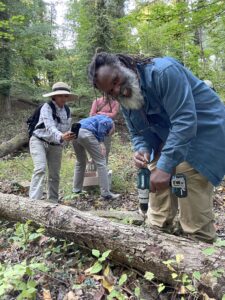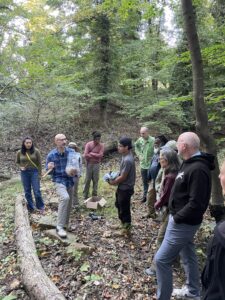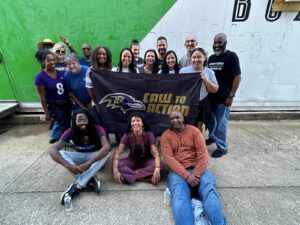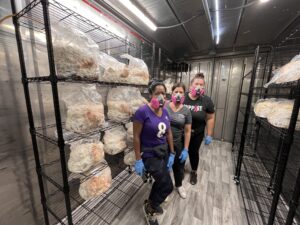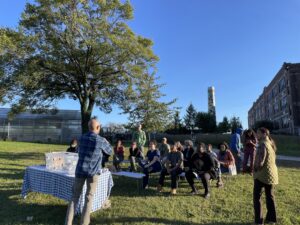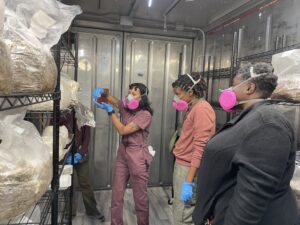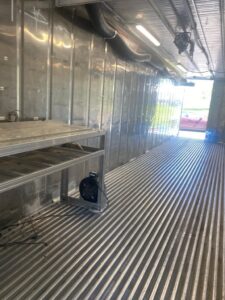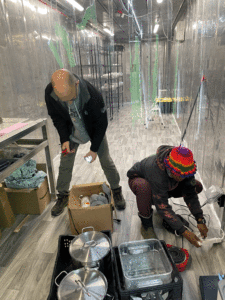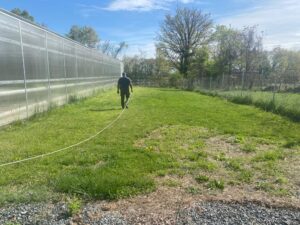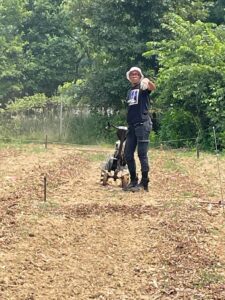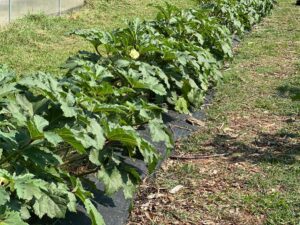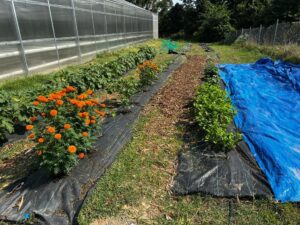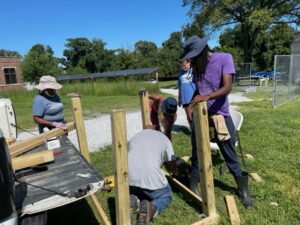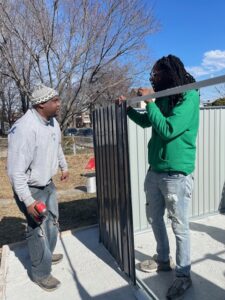Final report for LNE23-468
Project Information
Problem or Opportunity and Justification:
In the United States, structural and economic barriers disproportionately impact the well-being and capabilities of historically marginalized groups. On average, Black families have $5.04 in net worth for every $100 held by White families, and Black families are 40% less likely to own property than White families (Bailey et al. 2020). According to the Guardian, the number of Black farmers in America peaked in 1920, when there were 949,889 Black farmers. Since then, the number has dramatically decreased with the US Department of Agriculture recently reporting that of the country’s 3.4 million total farmers, only 1.3%, or 45,508, are Black (The Guardian, 29 April 2019). The underrepresentation of Black people in contemporary land ownership and agriculture is due to intergenerational impacts of systemic oppression. Legal barriers post-emancipation impeded land acquisition and kept Black families indebted to landowners; later, discriminatory lending practices prevented Black homeownership and devalued predominantly Black neighborhoods. Following COVID-19 market disruptions and affordability crises, Black people continue to be victims of land theft and predatory lending.
Solution and Approach: To reduce the negative impact of these challenges, Acres4Change creates economic stability through land access and ownership, professional development, and racial healing for minority groups, through three main objectives: supporting beginning farmers (“Stewards”) to become food secure and economically empowered through food production, sales of harvest, and ownership of land; establishing a professional network of farmers and landowners who are economically empowered and entrepreneurial self-starters; and providing Stewards with mental health and wellness support through social support and community building. We launched our inaugural Stewardship Program cohort in May 2022 to pilot our model of dedicated, localized support for aspiring BIPOC farmers with our network of Baltimore-based partner organizations. With the support of these partners and experts, we have been working to provide the training and support services needed for Stewards to become successful farmers and landowners. In the short term, this capacity-building project enables our Stewards to overcome many of the barriers that new, marginalized farmers face like basic and specialty agricultural training, access to racial healing support, and strong community partnerships. In the long-term, this project will equip Black farmers with the tools to generate sustainable income, foster a sense of belonging and community connectedness, and contribute to greater economic vitality in the surrounding communities of Baltimore, MD. Our approach is unique and effective because we’re creating new landowners in coordination with partner organizations and their training programs. This model is efficient and sustainable because we leverage the expertise and programming of our partners and create opportunities for earned income to fund generational wealth-building for our participants. In October 2024, Acres4Change and graduates of the Stewardship Program purchased their first parcel of land to launch the Sankofa Farm Collective in a community impacted by food apartheid. Our West Baltimore micro-farm collective model is designed to be replicated in other neighborhoods, with other cohorts of Stewards, creating a network of sustainable, community-driven farming initiatives. Through these activities, A4C tackles the racial wealth gap, supports land ownership for underserved farmers, and promotes environmental sustainability while strengthening local food systems.
Citations:
America’s formerly redlined neighborhoods have changed, and so must solutions to rectify them. (2022, March 9). Brookings. https://www.brookings.edu/research/americas-formerly-redlines-areas-changed-so-must-solutions/
Bailey, Z. D., Feldman, J. M., & Bassett, M. T. (2021, February 25). How Structural Racism Works — Racist Policies as a Root Cause of U.S. Racial Health Inequities. New England Journal of Medicine, 384(8), 768–773. https://doi.org/10.1056/nejmms2025396
Black Land Loss. (2022, May 13). World Food Policy Center. https://wfpc.sanford.duke.edu/resources/black-land-loss/
Hamilton, D., Mitchell, T. W., Rosenberg, N. A., & Stucki, B. W. (2022, May 1). Black Land Loss: 1920–1997. AEA Papers and Proceedings, 112, 38–42. https://doi.org/10.1257/pandp.20221015
Progressive Governance Can Turn the Tide for Black Farmers. (2019, April 3). Center for American Progress. https://www.americanprogress.org/article/progressive-governance-can-turn-tide-black-farmers/
There were nearly a million black farmers in 1920. Why have they disappeared? (2020, October 12). The Guardian. Retrieved October 21, 2022, from https://www.theguardian.com/environment/2019/apr/29/why-have-americas-black-farmers-disappeared
United States Department of Agriculture, National Agricultural Statistics Service “2017 Census of Agriculture,” (2019). https://www.nass.usda.gov/Publications/AgCensus/2017/Full_Report/Volume_1,_Chapter_1_State_Level/
Five Black farmers in Baltimore, MD will be trained in mycoculture, vegetable farming, farm operations, and business skills in collaboration with Baltimore-area partners, including Black Yield Institute, Farm Alliance of Baltimore, Future Harvest, and Innovation Works Baltimore. Stewards will grow approximately 10-20 tons of mushrooms at an education and demonstration site, complete the development of business plans, conduct direct-to-consumer sales and identify at least 2 markets for their products.
Acres4Change provided land and educational resources to qualifying individuals to generate income and economic stability through a two-year mushroom and vegetable farming and mentoring program designed to cultivate well-rounded farmers. Our mission was to foster economic stability through land access and ownership, professional development, and racial healing. Through the Stewardship Program, we trained underserved, beginning farmers (“Stewards”) in mycoculture, vegetable farming, farm operations, and business skills in partnership with Baltimore-area organizations. This project tackled the underrepresentation of Black farmers in agriculture by funding, educating, and establishing a Black-owned Farm Collective in West Baltimore. The program aimed to scale through earned revenue and ongoing mentorship, ensuring long-term sustainability for both current and future land Stewards.
Cooperators
- (Educator)
- (Educator)
- (Educator)
Research
Education
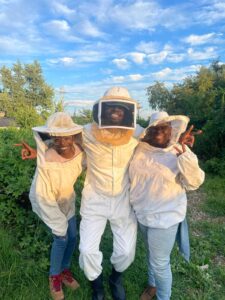
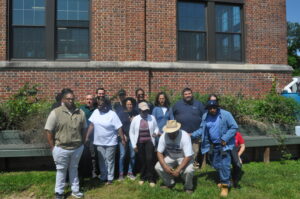
Engagement: The Stewardship Program is a cohort-based learning model open to Black, indigenous, people of color, and marginalized applicants. Our inaugural (pilot) cohort began with five aspiring, Black farmers. Acres4Change received 45 enthusiastic applications sourced from the Baltimore-area, including from the networks of our partner organizations: The Farm Alliance of Baltimore, Black Yield Institute, Future Harvest, and urban farms and community gardens in the region. Our participants (Stewards) met weekly, worked collaboratively at our demonstration site at Green Street Academy, and coordinated directly through a groupchat. They developed ongoing, productive relationships with trainers, mentors, and partner organizations who supported Acres4Change. We provided a travel stipend to support Steward participation which ensured that our programming was accessible. Future cohorts from the Baltimore area and beyond will be similarly sourced from community, civil society, and educational organizations interested in economic development, agriculture, and racial justice. Earned revenue from the demonstration site, along with a growing network of mentors and farmers, strengthened the local replicability of the cohort model. Our inaugural (pilot) cohort was built with a plan to scale through replicable systems, either through direct implementation by Acres4Change or documented lessons for replication by other communities.
Learning: Our program supported five aspiring farmers who were highly motivated individuals willing and able to create a future of food sovereignty and economic development for their communities. Our curriculum, developed in cooperation with partner organizations, supported beginning farmers in the fundamentals of agriculture and food security; the process of land transfer and management of a profitable farm-to-consumer business, and supported mental health through community building and wellness. It included the following core elements:
Mycoculture and vegetable farming through the ethnic crop garden and Charm City Caps Mushroom Farm: Hands-on Demonstration Site training; Land Access and Ownership; Farm Design and Operations (implemented through the establishment of Sankofa Farm Collective); and Business and Management Skills Sustainability.
Acres4Change and its partners (including the Black Yield Institute, Farm Alliance of Baltimore, Future Harvest, Green Street Academy, Garden International, Cornell Small Farms Program, and Kennesaw State University) offered both in-house and outsourced pro bono and paid workshops for our five Stewards. Our Stewards had the opportunity to complete Cornell University’s Community Mushroom Educator course which is a “train the trainer” program. This course along with the hands-on experience of starting and managing a mushroom farm (including retrofitting a freight farm) prepared our Stewards to design and facilitate workshops for 15-20 Baltimore area farmers at the end of the 2-year Stewardship Program. These farmers were recruited through our partner organizations including Farm Alliance of Baltimore, Black Yield Institute, and Future Harvest. During the 2-year program, Stewards gained knowledge, awareness, skills and attitudes in mycoculture and sustainable agricultural practices including weed and pest control, composting, cover cropping, food safety, pre-post harvesting, no-till, fertilizer management, and on-farm energy efficiency. Stewards, through the future launch of Sankofa Farm Collective, will teach these approaches to other urban, small, and community farms throughout the area while operating profitable small farm businesses. Acres4Change offers a sustainable pathway to land ownership and economic security for Black farmers in the United States.
Evaluation:
In the Fall of 2022, Acres4Change implemented its robust monitoring and evaluation plan documenting achievements towards the performance targets. The Project Advisory Committee assisted with the project evaluation. Methods included:
- performance monitoring- measured output and outcome-level achievement of project milestones and performance targets
- qualitative assessment to understand Steward experience and inform curriculum design and future scale, including structured interviews, feedback sessions, and surveys.
The project did not include experimental-style impact evaluation with counterfactual. Instead, we conducted a pre-post assessment documenting farm-level performance targets (production yield, income earned, operational status, business metrics such as customer acquisition, etc.). Lessons were documented to capture best practices, ensuring future Acres4Change cohorts and partner communities can replicate and build upon them.
Milestones
- Engagement: Steward, Mentor, and Partner Recruitment. 5 Stewards recruited from marginalized communities for two-year, part-time commitment. At least 10 mentors and 3 curricular partners recruited to train and support Stewards. Steward recruitment completed by May 2022 (complete), partner recruitment ongoing, with curricular partners secured by April 2023 and mentor recruitment completed by August 2023.
Status: Completed. Steward recruitment successfully concluded in May 2022 with 5 Stewards selected from 45 applicants. Since that time, three Stewards dropped out of the program due to personal reasons and one new Steward was onboarded in August 2023. A high school intern/steward was recruited in October 2023 from our partner Green Street Academy and onboarded in January 2024. In April 2024 we onboarded an alum of Green Street Academy to serve as a junior Steward. His role involves learning to cultivate mushrooms in the indoor farm and assisting with workshops and lessons for students, local farmers, and community members. In October 2024, Acres4Change, along with the Stewards, proudly acquired our first parcel of land, to establish the Sankofa Farm Collective. Three Stewards re-engaged with A4C, in the fall of 2024, to help prepare the land and refine the curriculum for the next cohort of Stewards.
Mentor and Partner recruitment completed May 2022.
Accomplishments: Stewards received curricular support from the following partners (individuals and organizations): Calabash Collective (business planning support through 1:1 meetings), Innovation Works Baltimore (mentorship), University of Baltimore Community Development Clinic (pro-bono legal services), Farm Alliance of Baltimore (agriculture training and technical assistance), Brioxy (mentorship), Black Yield Institute (networking and training), The Garden International (mycoculture resources and tips), Ulysses Archie of Baltimore Gifteconomy (agricultural education and training), Baltimore Roundtable for Economic Democracy (presentation and Q&A on different cooperative models), OurSpace World (networking and resource development), Neith Little (University of Maryland Extension--Baltimore City Extension Educator--Urban Agriculture), Larry Evans (retrofit contractor), David Becker (mycoculture consultant), Alex Riehm (IWB mentor-business planning), Mike Holcomb and Chris Ellis(mycoculture technical assistance - BaltiSpore).
- Learning: Agricultural Education. 5 Stewards receive agricultural education and training in mycoculture and sustainable agricultural practices including landscape management, produce safety, weed and pest control, composting and vermiculture, and on-farm energy efficiency offered by program partners and program coordinators. Training includes on-site farm improvements at demonstration site, including storage container retrofitting. Storage Container Retrofitting completed by May 2023. Stewards attain minimum acceptable competency in above-listed skills by May 2024.
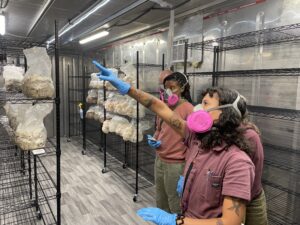
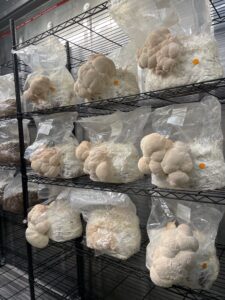
Status: Retrofit completed December 2023
Accomplishments: Altogether, Stewards have received hands-on agricultural education and training on sustainable agricultural practices including landscape management, produce safety, weed and pest control, and composting through the establishment and maintenance of an ethnic crop garden from May-November 2023 and the hoop house garden from October-December. The following events have been conducted with community partners: Compost workshop for Stewards and Green Street Academy Agriculture students, Ethnic Crop garden set-up and maintenance including drip irrigation installation and maintenance with Stewards, high school summer intern, and Black Butterfly volunteers, Site visits and technical assistance with Neith Little (Md Ag Extension Officer) and Alison Worman (Farm Alliance of Baltimore), Soil Science Zoom workshop with Neith Little. Stewards also learned about vermiculture and on-farm energy efficiency. Between February and May 2024, Stewards participated in orientation and hands-on activities to learn how to set up and manage the mushroom farm, including tasks such as sanitizing, harvesting, marketing, and sales. From November 2024 to February 2025, Stewards actively participated in designing and setting up the micro-farm, laying the groundwork for the launch of the Sankofa Farm Collective and the next cohort of Stewards.
- Learning: Business Planning and Launch. 5 Stewards receive business and financial planning from partner organizations and mentors. Stewards finalize farm-level business plans for each of the subsidiary farm-based businesses, including commercial viability metrics: unit economics and farm-level breakeven, input financing, market analysis, cooperative management, and revenue projections. Farm-level business plans completed by February 2024. Full curriculum completed and 5 small farms launched by May 2024.
Status: Completed
Accomplishments: Altogether, 5 Stewards received business and financial planning support from our partner organizations and mentors (Calabash Collective and Innovation Works Baltimore). Based on the legal feedback received, the Stewards opted to establish a joint ownership and collective farm business model. Two stewards graduated from the 2-year program and 2 small farm businesses will be launched in spring 2025 on land owned by the collective. Stewards are specializing in business activities (composting, herb garden and community gardens).
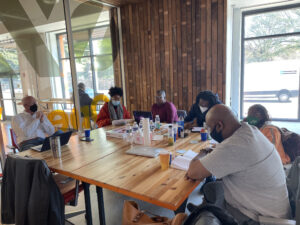
- Engagement: Community Engagement and Impact. 5 Participating Stewards, Acres4Change staff and volunteers, and partner organizations and mentors conduct community outreach, engagement, and service on topics related to healthy food access and awareness, community and economic development and land sovereignty, racial justice and healing, and healthy lifestyles and mental health. At least 24 events conducted with community partners from the demonstration site by November 2024.
Status: Completed
Accomplishments: We hosted an all-day agriculture and food justice expo, in collaboration with Green Street Academy, 3 Stewards, and 1 intern in April 2024 at the demonstration site. We did some community outreach in the Central Park Heights neighborhood including site visits with Plantation Park Heights Urban Farm and got both advice and support from their farm community to establish the farm collective in the Park Heights community. We deepened our engagement with our host site, Green Street Academy, with the new student intern and increased learning opportunities through the mushroom farm. Our team held a recruitment and mushroom farming info session with the 11th graders and one 7th grader. Acres4Change hosted one workshop through the Farm Alliance Black Butterfly program and continued to provide volunteer opportunities for participants of the Black Butterfly program in 2023 and 2024. The Agriculture Expo was held in May 2024 to coincide with the Steward graduation. Stewards, junior steward, and the intern led and co-led farm tours and workshops on soil health, mycoculture, composting, and herbalism for over 20 attendees. In October 2024 Stewards and our junior steward held an educational volunteer event in partnership with the United Way Foundation. 13 participants were divided into three groups and engaged in educational tours of the Green Street Academy (GSA) farm and Acres4Change's Charm City Caps mushroom farm. Volunteers also worked alongside GSA agriculture students to clean out the hoop house; they learned about mushroom cultivation, and inoculated tree branches in the woods with oyster mushroom plugs. In addition, volunteers contributed to cleaning up the stream and grounds by removing litter and trash. Days after hosting United Way volunteers, we hosted a Field Day with the Farm Alliance of Baltimore, a membership resource collective for city-wide farms, in which we provided handouts and demonstrated basic mycology and foraging teachings, before splitting into groups to inoculate more branches in the woods, while simultaneously giving educational tours of our grow chamber. 17 engaged attendees showed up ready to learn and volunteer. In January 2025, we hosted another volunteer group in collaboration with the United Way Foundation. Volunteers learned about mushroom cultivation, our mission, and community work while assisting with a construction project at Sankofa Farm Collective.
- Evaluation: Performance Monitoring and Evaluation. Project Advisory Committee leads program evaluation, with performance monitoring delegated to Acres4Change staff. Performance monitoring ongoing through project activities with final pilot project report completed by November 2024.
Status: Completed.
Accomplishments: The advisory committee met 2 times since March 2023. Evaluation tools were drafted, and Stewards were involved in ongoing program monitoring. Stewards completed an end of year 1 evaluation in May 2023 and we conducted individual check in meetings with Stewards throughout Year 1. We have continuously adapted our program based on valuable feedback from the advisory committee and the Stewards. Throughout the process, we have navigated multiple pivots to enhance program outcomes and refine a scalable, place-based model. In 2022, the Stewards conducted their workshops and training in and around Baltimore City through community partners. In response to the Stewards' 2023 request for in-house workshops and hands-on training, we established an ethnic crop garden. Following consultations with UB Law Clinic and BRED, the Stewards proposed establishing a jointly owned farm collective, deviating from A4C's initial recommendation for a Farm Cooperative. We also introduced guest presenters at bi-weekly meetings for an added educational dimension. While A4C suggested purchasing semi-rural or suburban land for Sankofa Farm Collective, the Stewards opted to stay in the city to address NIMBY issues and transportation challenges. We were actively pursuing a city-owned parcel of land in Central Park Heights for Sankofa Farm Collective but that did not materialize. A4C supported the Stewards in acquiring a parcel of land in West Baltimore and developing infrastructure and business plans for the site. The advisory committee met twice as a group in 2024, while two committee members offered individual support throughout the year. Stewards completed the survey forms, contributing valuable feedback to enhance the program.
- Learning: Land Acquisition and Transfer. Stewards learn the fundamentals of real estate and setting up a cooperative farm business from our board members Assaati and Krystle, our realtor, consultants, and OurSpace World. 3-5 acres of Land acquired by Stewards. Earned revenue generated by demonstration site, paid workshops piloted by Stewards. Donations and capital contributions received. Deed transfers completed by August 2024.
Status: Completed.
Accomplishments: Two former board members accomplished the following with the Stewards before moving on to other endeavors: hosted a visioning session to debrief the Urban Ag proposal and brainstorm Stewards’ wants and needs for land. We recruited three new board members who officially joined the board at the end of January 2024. Realtor, Fatimah, hosted a real estate Zoom workshop for the Stewards on December 4, 2023. A4C and 3 Stewards submitted an unsolicited bid to the city of Baltimore to acquire ~16,000 sqft of land in Central Park Heights which would have hosted our 3 farm businesses and an outdoor education/learning center for the community. We did not get a response from the City. The Baltimore Roundtable for Economic Democracy (BRED) did a Zoom workshop with the Stewards to discuss different farm cooperative models. The Stewards decided, based on their feedback from BRED and the Legal Clinic, to set up joint ownership of the land and create a collective farm in lieu of a cooperative. A4C could generate $60K in revenue from the mushroom farm in a good year. Due to staff transitions and retrofit challenges, we operated Charm City Caps at less than 5% capacity and generated roughly $2800 from sales. Stewards officially graduated in May 2024 and closed on a parcel of land in October 2024. The Stewards and A4C are co-owners of the land. The A4C Land Committee, the University of Baltimore’s Community Development Clinic, and an additional legal partner are working together to develop the legal structure, framework, and agreements between A4C and the Sankofa Farm Collective.
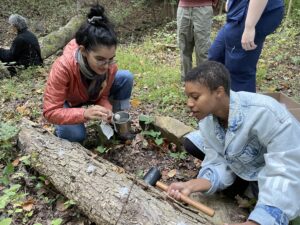
- Evaluation: Acres4Change project personnel will conduct post-implementation monitoring of farm performance. Participating Stewards and Mentors will support curricular development for 10 new Stewards recruited in Spring 2024 with project activities ongoing beyond the scope of the proposed activities.
Status: Completed
Accomplishments: The pilot 2-year Stewardship Program ended in May 2024. A4C worked on the structure and composition of the Stewardship Program, post May 2024, based on the evaluation and assessment of the program. We were hoping to work with Matson Consulting through the National Cooperative Business Association to assess the Stewardship Program and develop a strategic and sustainability plan for its next iteration. That partnership did not happen because of various challenges. We had many successes and challenges over the last couple of years which informed the future structure of the program. We documented the lessons learned from the retrofit delays which impacted our revenue projections; We paused our efforts to acquire land through an unsolicited bid with the City of Baltimore and instead secured our urban farm site by purchasing land at an auction. Through these evaluation activities we expect to scale our place-based intervention and program model. In March 2025, Stewards will participate in a half-day retreat focused on planning/redesigning and finalizing the roll out of the 2025 Stewardship Program. Their evaluations and recommendations already played a key role in shaping the program’s restructuring plan.
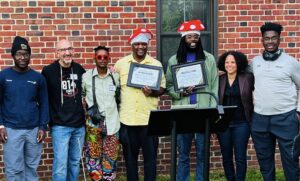
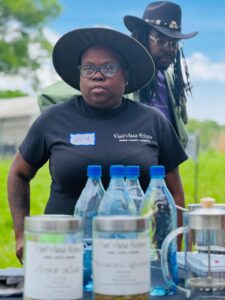
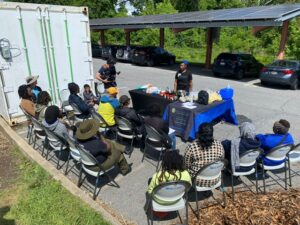
Milestone activities and participation summary
Participation summary:
Learning Outcomes
Performance Target Outcomes
Target #1
5
Five Black farmers in Baltimore, MD will be trained in mycoculture, vegetable farming, farm operations, and business skills
Stewards will grow approximately 10-20 tons of mushrooms
Stewards will complete the development of business plans, conduct direct-to-consumer sales and identify at least 2 markets for their products.
3
Establishment of an ethnic crop garden, new mushroom varieties, and establishing a micro-farm collective in a food desert.
small scale for both ethnic crop garden and mushroom farm- altogether under 300lbs.
increased appreciation for and consumption of ethnic crops like callaloo and okra.
Our verification methods included an end-of-year evaluation where participants ranked their knowledge of each outcome before and after the workshops and training. We also gave them the opportunity to demonstrate their knowledge and skills by establishing an ethnic crop garden from scratch. As part of the process, Stewards experimented with various deer repellent strategies—covering the callaloo with a net, using incense sticks, and sprinkling cayenne pepper around the damaged fence area—all of which proved ineffective. However, they successfully installed a drip irrigation system, improved watering methods, and implemented weed control strategies. During our Ag Expo and program graduation, Stewards were required to lead or co-lead workshops on soil health, composting, and herbalism. More recently, one of our Stewards, who did not complete the program but remained engaged, is now the farm manager at Whitelock Community Farm. She is applying what she learned by running the farm and supporting our graduates in setting up the Sankofa Farm Collective. Stewards are in the process of establishing their micro-farm to put into practice all that they have learned and will continue to be supported and mentored by Acres4Change and its partners.
[caption id="attachment_1237927" align="alignnone" width="300"]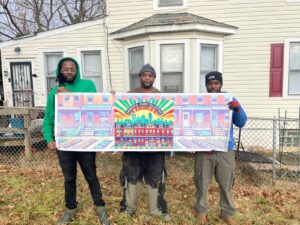 Sankofa Farm Collective[/caption] [caption id="attachment_1237928" align="alignnone" width="300"]
Sankofa Farm Collective[/caption] [caption id="attachment_1237928" align="alignnone" width="300"]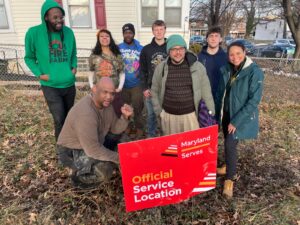 Sankofa Farm Collective volunteer day[/caption] [caption id="attachment_1237929" align="alignnone" width="225"]
Sankofa Farm Collective volunteer day[/caption] [caption id="attachment_1237929" align="alignnone" width="225"]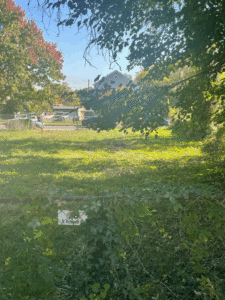 Our Land!![/caption] [caption id="attachment_1238360" align="alignnone" width="225"]
Our Land!![/caption] [caption id="attachment_1238360" align="alignnone" width="225"]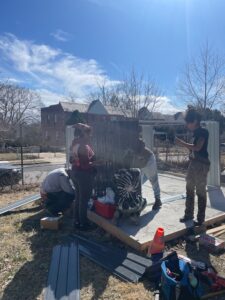 Stewards and community members build a tool shed for Sankofa Farm Collective.[/caption]
Stewards and community members build a tool shed for Sankofa Farm Collective.[/caption]
Additional Project Outcomes
At program graduation, one of our Stewards expressed gratitude and reflected on his experience as a Steward in his speech, highlighting the knowledge he gained from Acres4Change and key partners, including the Farm Alliance of Baltimore, Whitelock Community Farm, and other collaborators. He shared his appreciation for learning where the majority of his food comes from and acknowledged Acres4Change for providing him the opportunity to be part of this transformative movement. With a deep sense of purpose, he outlined his commitment to advancing in the agricultural justice movement and making a lasting impact.
